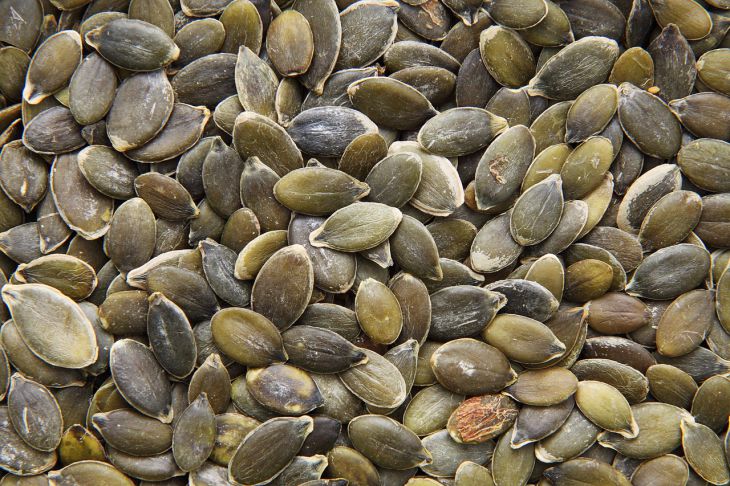Pumpkin seeds have long been known for their medicinal properties and are widely used as a food supplement. But how safe are these seeds for our health?
On the one hand, pumpkin seeds are rich in protein, fat and minerals such as zinc and magnesium.
They help improve heart function, support the immune system and promote bone health.
They are also believed to be a natural aphrodisiac and can help with various men's health problems.
However, do pumpkin seeds have any disadvantages or potential harm? Let's find out!

Why do we need pumpkin seeds?
Pumpkin seeds have many beneficial properties that can have a beneficial effect on human health. They are rich in vitamins and minerals such as iron, zinc, magnesium and calcium. Vitamin E, found in pumpkin seeds, is an antioxidant and helps protect cells from damage.
Pumpkin seeds also contain phytosterols, natural compounds that help lower blood cholesterol levels. They are also rich in plant proteins and healthy fatty acids.
Regular consumption of pumpkin seeds can help improve the digestive system due to their high dietary fiber content. They can also help control appetite and prevent overeating.
Finally, pumpkin seeds have a long history of use in treating prostatitis in men. Research shows that pumpkin seed extract may help reduce symptoms of prostatitis, such as frequent and painful urination.
Overall, pumpkin seeds have many health benefits and are an excellent source of nutrients.
The benefits of pumpkin seeds for the human body
Pumpkin seeds are a real treasure trove of nutrients and beneficial properties for the human body. They are rich in proteins, fatty acids, vitamins A, E, D and group B, as well as microelements - zinc, iron, magnesium and phosphorus.
Regular consumption of pumpkin seeds can improve the digestive system and metabolism, reduce blood cholesterol levels, and prevent cardiovascular diseases and diabetes. Pumpkin seeds also help strengthen the immune system and protect against infections.
It is important to note that pumpkin seeds can be an allergenic product. If you have allergic reactions to nuts or other products, you should consult a specialist before consuming the seeds.
Thus, pumpkin seeds are a useful addition to the human diet due to their high nutritional value. However, like any product, they should be consumed taking into account the individual characteristics of the body.

Harmful effects of pumpkin seeds: myths and reality
There are many myths about the harm of pumpkin seeds, but most of them have no scientific basis. For example, they say that eating pumpkin seeds can cause constipation. However, this is not true, since the seeds contain a large amount of soluble and insoluble fibers, which only help normalize digestion.
There is also a common myth that pumpkin seeds can damage tooth enamel and cause caries. This is not true: the seeds actually contain minerals (such as zinc and phosphorus) that are beneficial for dental health.
However, it is worth noting that pumpkin seeds are very high in calories (about 600 kcal per 100 grams), so eating them in large quantities can lead to excess weight. It is also worth remembering about a possible allergic reaction to pumpkin seeds - if you suffer from allergies to foods or other types of nuts, you should be especially careful when eating seeds.
Thus, we can conclude that pumpkin seeds are a healthy and tasty product that can be consumed in reasonable quantities.
How to Use Pumpkin Seeds in Cooking and Medicine
Pumpkin seeds have many health benefits and can be used in both cooking and medicine. In cooking, pumpkin seeds can be added to salads, baked goods, side dishes, and sauces. They have a nutty flavor and crunchy texture, making them a great ingredient for adding texture to dishes.
In medicine, pumpkin seeds are used to prevent prostate diseases in men. This is due to the zinc content in pumpkin seeds, which helps maintain prostate health. In addition, pumpkin seeds are a rich source of antioxidants, which helps maintain heart health.
There are several ways to cook pumpkin seeds: you can fry them in a frying pan without oil or bake them in the oven with spices or honey. They are also sold peeled, which makes them easier to use in cooking.
However, it is worth remembering the possible contraindications for consuming pumpkin seeds.
What conclusions can be drawn about pumpkin seeds
Pumpkin seeds are a valuable source of nutrients for the human body. They contain a lot of protein, fat, vitamins and minerals such as zinc, magnesium and iron. Due to this, they are useful for maintaining the health of the heart, bones and the immune system.
However, there is a certain risk in consuming large amounts of pumpkin seeds. This is due to the high content of omega-6 fatty acids, which can lead to increased cholesterol levels in the blood and the development of inflammatory processes in the body.
When consuming pumpkin seeds, you should be moderate. It is recommended not to exceed the daily norm - 30 grams per day. It is also worth remembering the possible risk of allergic reactions to the seeds.
Overall, we can conclude that if you use them correctly in food, pumpkin seeds will be beneficial to human health. But, as with any product, you need to stick to moderation and not abuse them.








